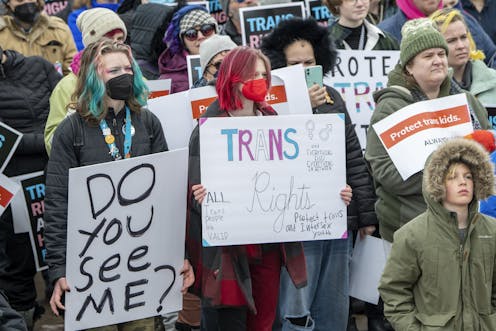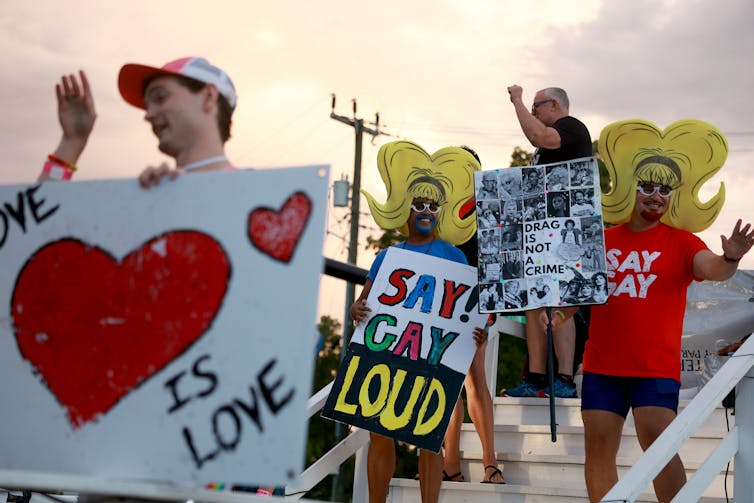
Several cities and towns, mostly in the American Midwest and South, are responding to a surge of proposed and approved legislation that restricts gay and transgender people’s rights by declaring they are “sanctuaries” for people who identify as LGBTQIA+.
States like Alabama, Texas, Florida, North Dakota and Montana have passed 84 laws in 2023 alone that restrict LGBTQIA+ rights, primarily targeting transgender kids.
Some of these laws require teachers to call trans students by the name and pronoun they were assigned at birth, for example, and prohibit any students from discussing sexual orientation or gender identity.
In September 2023, the small town of Lake Worth Beach, Florida, was the latest to say that it was “a safe place, a sanctuary, a welcoming and supportive city for LGBTQIA+ individuals and their families to live in peace and comfort.”
At least 15 states and cities have dubbed themselves LGBTQIA+ sanctuaries over the last several years.
Sanctuaries are generally considered local refuges, where people who are afraid of persecution or discrimination have legal immunity from particular government policies or laws.
As a scholar of constitutional law and a student of sanctuary movements, I think that sanctuary declarations of all kinds raise important questions of constitutional law.
The most difficult is the question of whether and when these declarations violate the U.S. Constitution by placing state or local law above federal law.
The short answer is that it depends on what these declarations actually promise.

Sanctuaries’ history in the US
Sanctuaries are a long-standing part of the United States’ constitutional history.
In the 1980s, for example, Los Angeles, Chicago and Boston, among other places, said they would not cooperate with federal immigration officials trying to deport Central American migrants. These cities’ representatives said the migrants were eligible for asylum and had fear of returning to their homelands because of persecution – but federal judges still did not give them the right to stay in the U.S.
More recent examples include the proliferation of Second Amendment sanctuaries in local towns and counties in 42 states, which say they will not enforce a variety of federal gun laws.
Now, Tallahassee, Florida, is among the places that is considering declaring itself a LGBTQIA+ sanctuary. Other places – including Austin, Texas and Kansas City, Missouri – have also made themselves LGBTQIA+ sanctuaries over the last few years.
Most of the sanctuaries focus on the rights and protection of trans kids and their families, in particular.
In some places, like Austin, the aim is to create a “safe place, a sanctuary, for transgender children and their families.” In Kansas City, the intent is to make the city “a sanctuary for people seeking or providing gender-affirming care.”
Are they legal?
Sanctuary declarations raise important and difficult questions of constitutional law, especially when they claim immunity from federal laws or the U.S. Constitution. That’s because the Constitution contains Article 6, commonly known as the supremacy clause, which says that the Constitution and federal laws trump any state or local law.
The supremacy of the Constitution to state and local laws is a key part of how the U.S. government works. It means that state and local governments must act within the confines of the Constitution, even when state or local lawmakers disagree with federal law.
So, does the Constitution allow places to say that they will not follow discriminatory laws, such as those that prevent trans students or faculty from use of the restrooms that match their gender identity?
The answer often depends on a sanctuary declaration’s precise wording and meaning.
Some sanctuary declarations, like the Lake Worth Beach resolution, are simply rhetorical statements of support or opposition to a particular cause or policy. They have little or no legal consequences.
Others, like some Second Amendment resolutions, announce that local officials, often sheriffs or other law enforcement personnel, will not enforce or comply with laws restricting guns that they regard as unconstitutional.
In these sorts of cases, the proclaimed sanctuaries directly challenge what the Constitution says, specifically that the Constitution and federal laws are “the supreme Law of the Land”. State laws or laws passed by lower levels of government cannot overrule them.

Devil is in the details
It is important to note, however, that not all sanctuary declarations violate Article 6.
When it comes to whether sanctuaries declared by states, cities or small towns are legal, the devil is in the details – as with most things concerning the Constitution.
A sanctuary resolution that only says that local officials disagree about what the Constitution means or requires, without pledging to break federal law, is simply freedom of expression.
Consequently, a claim of sanctuary for LGBTQIA+ people that simply declares a city or a town a safe and welcoming space, without calling for anything else or any kind of direct violation of federal law, is constitutionally protected. This is what the Lake Worth City sanctuary declaration does.
A more complex case arises when sanctuary spaces claim immunity not from federal law, but rather from state or local laws that impede a certain group of people’s rights. These kinds of sanctuary declarations do not ordinarily challenge the authority of Article 6 or the Constitution, in general, because the sanctuary claim is made against state laws, not federal law or the Constitution.
Indeed, in many such instances, these sanctuaries seek to protect people’s federal civil liberties and rights against discriminatory state laws. This is what the Lake Worth Beach resolution and other LGBTQIA+ resolutions do.
These sanctuaries actually reinforce the Constitution’s authority by insisting upon the power of people’s basic, constitutional principles and rights over discriminatory state laws.
Sanctuaries that promise a safe space for people who identify as part of the LGBTQIA+ community do not undermine federal constitutional law.
Instead, they seek to make good on the Constitution’s commitments to equality and human dignity against discriminatory policies. Unlike some sanctuary resolutions, most LGBTQIA+ sanctuaries do not threaten the Constitution – they celebrate it by insisting upon the supremacy of basic constitutional rights and principles without violating Article 6.
John E. Finn is Professor Emeritus of Government at Wesleyan University.
This article was originally published on The Conversation. Read the original article.







